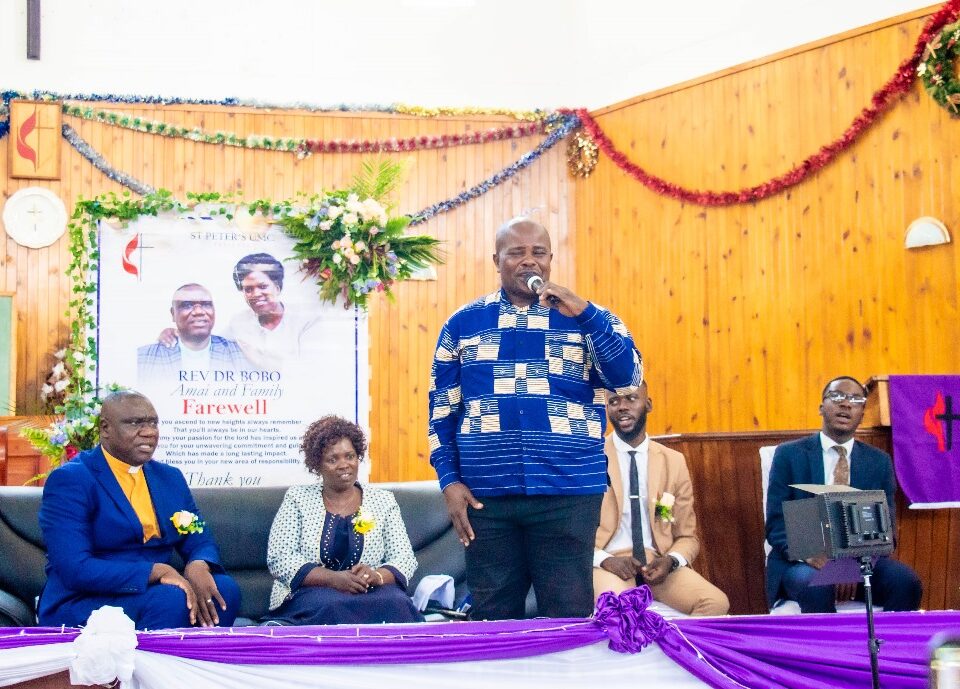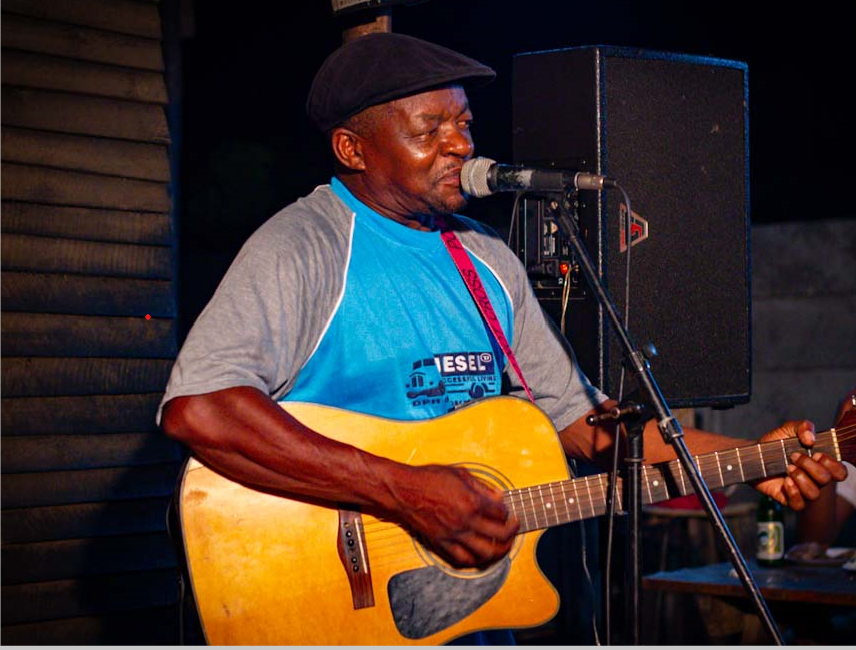
Steve Chikotie to serenade lovebirds at White Horse Inn Valentine’s Day dinner
February 14, 2024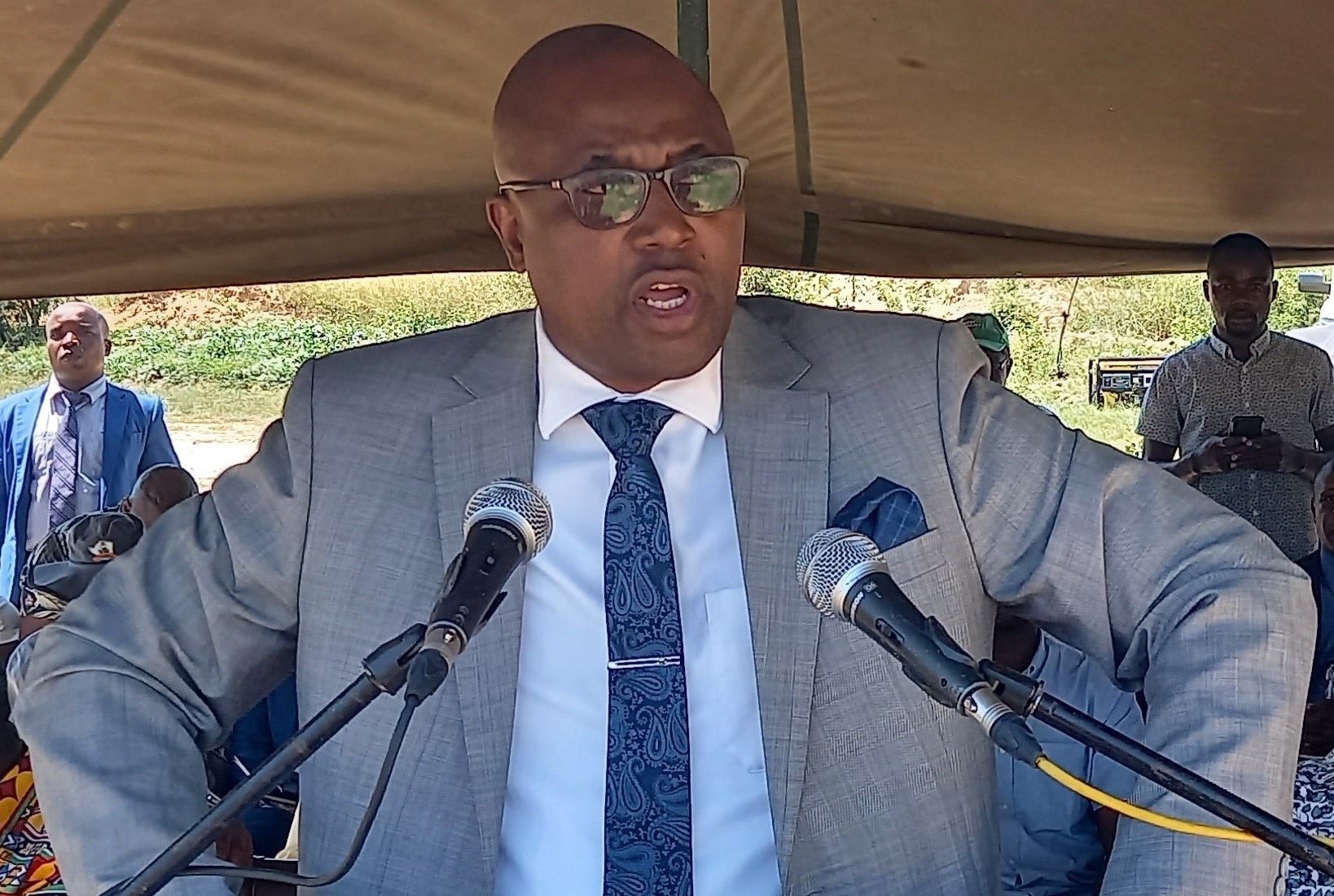
Seven (7) days ultimatum for Gimboki ‘illegal settlers’
March 22, 2024KudaVana Children’s Home set off orphan’s reunification, fostering and adoption drive
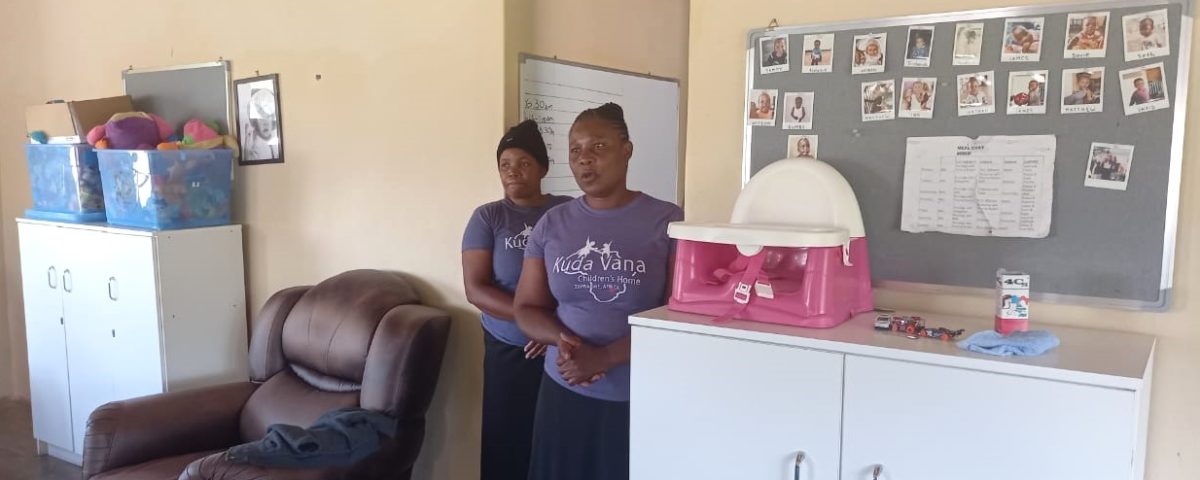
The caregivers at one of the group homes at KudaVana Children's Home in Zimunya.
…’We are willing to partner whoever wants to help this campaign’
Ngoni Dapira
REGARDLESS of having in place essential support systems and comfortable care homes, orphans need to be exposed to family systems to really experience good upbringing, the director of KudaVana Children’s Home has said.
This was said during a recently held media tour of the Zimunya based children’s home in Mutare South which was running under the theme, “Every child deserves a family.” Despite being in a peri-urban location, the centre has modern facilities and is currently the only children’s home in Mutare with a nursery to accommodate infants dumped from birth. However, regardless of its capabilities to provide a comfy and safe haven for orphans, KudaVana has started a campaign to advocate for tracing and reunification, fostering and adoption of orphans in Zimbabwe.

L-R: KudaVana psychologist social worker Jotinah Vambire, the administrator Davis Mundirwira and director William Pepukai.
The director of KudaVana Children’s Home William Pepukai said so far they have sent four children back to their families through tracing and reunification, which gives them hope that reunification is implementable.
“We have orphans with different backgrounds. Those dumped as infants even below the age of one, those abused by parents or a parent and flee their home, as well as those whose parents would have passed away and have no capable or willing relatives to take care of them. But now, we are advocating for tracing and reunification, fostering and adoption as best practices to really give a good upbringing for orphans and vulnerable children,” said Pepukai.
Adding, “This has since been adopted in developed countries but it’s high time we acculturate ourselves to foster or adopt orphans. Even traditionally, the community took care of orphans, this is similar to fostering or adoption, only that in this case it will be one person or a family that has to take the button and full responsibility of a child or children,” he said.
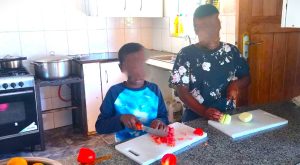
Some of the children learning how to cook in one of the group homes. (blurred faces to protect their identity)
A foster parent is an adult licensed by the state to care for a foster child or children. Most foster parents provide temporary care of the child or children who will be staying in children’s homes. Adoption on the other hand is a process whereby a person assumes the parenting of another, usually a child, from that person’s biological or legal parent or parents. It is more of a permanent arrangement as compared to fostering. Whilst tracing and reunification consists of the processes that lead to reconnecting a child with their biological or primary caretakers in the case of orphans in care homes.
In Zimbabwe, abortion is illegal except under conditions of rape, incest, fetal abnormalities or maternal conditions dangerous to the wellbeing of the mother. Unfortunately, this forces the women, who are usually adolescents or younger women to practice baby dumping, which is very prevalent.
Pepukai said their advocacy on reunification will be encouraging foster parents or children’s homes to help in the reunification process. “The idea is creating the opportunity for a child to meet their biological caregivers after a period of falling-out or any other possible traumatic event. This is the best healer. This is an important goal for many children in foster care, as it allows them to return to their biological families and maintain strong connections with their parents or relatives, which is significant in our African tradition, where it is believed one should know their lineage to receive blessings,” he said.
Situated in Zimunya about 40 kilometres south of Mutare, KudaVana Children’s Homes has the capacity to house 50 children. The centre has a nursery and five care home units which house a maximum of 10 children each. In most cases children taken to the centre would have been badly abused or dumped as infants, but all of them come through the Department of Social Welfare in the Ministry of Public Service, Labour and Social Welfare.
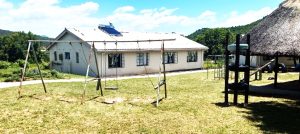
The play centre at KudaVana.
The centre was established in 2006 but was first called Murwira Children’s Home, based in Murwira village in Marange. Pepukai said in 2015, Government introduced the concept of group homes which they embraced and mobilized resources to build a new care centre at their current location in Zimunya. He said they run on an approximately US$200 000 budget annually to manage the centre, and take pride in their mission of providing quality education for the children whom they send to decent schools including private schools, resources permitting.
“We want to produce leaders among these orphaned children and show the world that being an orphan should not be a barrier to success or achieving their dreams,” said Pepukai.
KudaVana psychologist social worker Jotinah Vambire said healthy parenting means nurturing the whole child, attending to physical, mental, social, emotional and intellectual needs. She said whilst they are providing for this in their care homes, the family setup is however always best for a good upbringing which is why fostering and adoption is now their drive.
“People need to understand that fostering or adoption is for free and is not a preserve for the rich or for white people. This is what we want to encourage people. We want churches to encourage this so that people embrace the concept of taking in other children as their own. You might help raise the next President of Zimbabwe or the next billionaire,” she said.
Adding, “Many homes get lonely because children would have grown up and left but the couple would still be able to raise children. Under such circumstances we are urging such couples to foster children or even adopt.”
Pepukai implored on the First Lady Dr Amai Auxillia Mnangagwa to take up this campaign, through her Angel of Hope Foundation, whose vision is to uplift lives of disadvantaged children and other vulnerable members of society. He said they are going to engage her foundation and many other organisations interested in child welfare.
In 2019, the Ministry of Health and Child Care conferred the First Lady as the Health and Child Care ambassador to honour her philanthropic work countrywide.
“As KudaVana we are complementing government’s vision that ‘every child deserves a family’, but understand that resources are not sufficient to go it alone. We intend to partner the Department of Social Welfare in financing cases of tracing and reunification and help in any way to promote the campaigns of encouraging people to take up fostering and adoption. We are going to knock on many does and we will implore the First Lady Dr Amai Mnangagwa to help us on this drive because of her influence and interest in such humanitarian works. We are willing to partner any organisation to run this programme successfully in Zimbabwe,” said Pepukai.
He added that as KudaVana they are also running a Youth Transition Programme in Buhera to cater for those children that would have come of age (18 years) to stay in their care homes as mandated by the laws of country. “We have a halfway –house in Buhera where we are taking care of these children up to the age of 25 where we educate them till university or college level for them to get a stepping stone in their life,” said Pepukai.
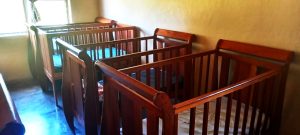
The cot beds in the nursery at KudaVana.
One-on-One with the administrator of the centre Davis Mundirwira
Qn: How many infants are you getting after being dumped per week or per month and usually between what ages?
Ans: There is no particular frequency with regards to the number of dumped babies we receive. It’s really just all circumstantial, sometimes you can get dumped babies once every month for six months in a row, and then none for the next six months as an example, or you get three babies in one week and none in three months. The trend of infants dumped is from 0-14 days and then older ones from three to four months old. Those dumped at birth suggest that the mother was unwilling to have a baby in the first place which is planned baby dumping whilst those dumped later suggest the mother is willing but faces difficulties such as health care, financial or abnormalities on the baby. You will find day olds are dumped to die or thrown in toilets and bins, whilst older children are dumped at people’s gates.
Qn: What is the capacity of your nursery and how long have you been running the nursery?
Ans: Our nursery has an optimum capacity of 10 children. It has been running since 2016.
Qn: You are offering excellent care home services. How are you managing financially?
Ans: Funding, we rely on well-wishers. We have had support from people across the country and abroad.
Qn: Can one adopt the children directly or it is through the Ministry of Social Welfare. Are many infants and children finding second homes or you wind up taking care of them till they reach 18 years?
Ans: All our children are committed to our home through the Ministry of Social Welfare, so any adoption or fostering is through the Ministry of Social Welfare. We have about seven children who have been adopted in the last four years. And two children are on fostering. Those that are not adopted, reunified or fostered we have to look after them until they reach 18 years. We have taken a more deliberate and active effort towards reunification, adoption and fostering in order to get as many of our children into family setups. Institutions are the last resort as every child deserves a family.
Qn: Which schools do the children attend?
Ans: We have a satellite school for our primary school pupils here at the centre. We decided on this setup to allow for more committed tutoring for our children before going into the public education systems. A lot of our children also come with delayed milestones, learning disabilities and traumatic backgrounds, so they need patient and understanding teachers who are willing and able to go the extra mile, knowing that they are dealing with “special” children. After primary level we send them to mainstream public and private schools around the country, depending on our financial resources and the pass rates of the child.
Qn: What success stories are there of children that have been raised through your centre?
Ans: We have a girl who completed a teaching course at Mutare Teachers College and is now working. A boy who graduated at Midlands State University with a bachelor’s degree in Finance and is now working. Two boys are pursuing Social Work degrees at Africa University and one girl is in the United States of America pursuing a tourism diploma. We also have five boys in vocational training centres pursuing various trades. We have taken up the responsibility to nurture them till they are independent until the age of 25 years after completing a life skill course. As opposed to just releasing them after turning 18 years, just after completing their Advanced Level, which is what the law prescribes.


